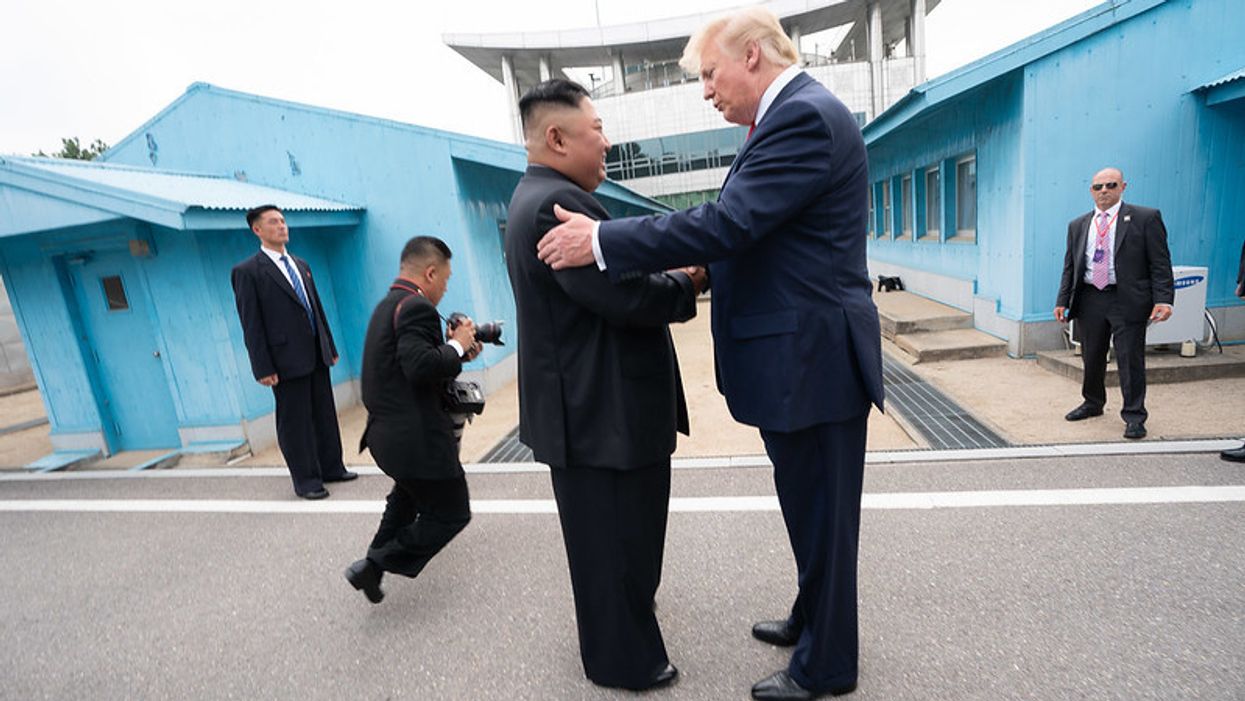How North Korea’s Dictator Scammed Trump
Donald Trump had a bad week. He went to West Point to make himself look like a strong leader but raised doubts about his health when he struggled drinking water and descending a ramp. His first Supreme Court appointee wrote the opinion in a case upholding gay and transgender rights.
The court also struck down Trump's effort to deport undocumented foreigners brought here as children. His former national security advisor wrote a book painting the world's most powerful person as an ignorant sleazebag who was guilty of the impeachment charges and more.
Trump had to reschedule a Tulsa rally planned for Juneteenth, but he insisted on holding it the following day — risking lives in a state suffering a surge of the coronavirus. New polls showed him trailing Joe Biden by landslide margins.
In any other week, it would be major news that the North Korean government blew up an office building that had been used for meetings with South Korean officials. Ordinarily, Americans might have taken note that, as The New York Times reported, the regime is threatening "to extinguish the fragile detente with a new cycle of bellicose actions and military provocations."
Attention would have been riveted by disclosure in Bolton's book that Trump's get-togethers with Kim Jong Un were not about eliminating North Korea's nuclear program but merely at making himself look good.
In reference to the first meeting, in Singapore, Bolton says Trump told him "he was prepared to sign a substance-free communique, have his press conference to declare victory, and then get out of town." Though Trump cared little about nukes, making sure that Kim received an Elton John CD "remained a high priority for several months."
Trump has been a failure in many areas, but nowhere else has there been a greater distance between what he claimed to achieve and what he actually did. In his telling, he averted the war that Barack Obama had been on the verge of initiating. "You would, right now, be in a nice, big, fat war in Asia with North Korea if I wasn't elected president," he claimed last year, in one of his hallucinatory episodes.
At the outset, it was Trump who sounded ready to launch an attack. In 2017, the Pyongyang regime carried out a successful test of an intercontinental ballistic missile capable of reaching the U.S. mainland. The president responded by declaring that if North Korea threatened us, "They will be met with fire and fury like the world has never seen." In a speech at the UN, he said, "Rocket Man is on a suicide mission for himself and for his regime."
But soon Trump changed his tune. He dispatched CIA Director Mike Pompeo to North Korea, and soon he agreed to travel to Singapore to meet with Kim. He made this concession even though the CIA, according to NBC News, concluded that "North Korea will not give up its nuclear weapons, but it may be open to allowing a western burger chain to open a franchise in the country."
In June 2018, his first summit with Kim yielded a vague joint communique and Trump's agreement to suspend joint military exercises with South Korea. But he immediately tweeted, "There is no longer a Nuclear Threat from North Korea."
In fact, Kim never gave up a single nuclear weapon. What he did instead was manipulate Trump with flattery. "He wrote me beautiful letters," the president gushed in 2019. "We fell in love."
But their love affair has not kept Kim from expanding his nuclear arsenal. Nor has he closed any of the reactors that produce weapons fuel. North Korea has gone back to regular missile tests. Last month, Kim convened his military leaders to announce "new policies for further increasing the nuclear war deterrence of the country," according to the government.
In short, Trump held three grand summits with Kim, bragged about eliminating the nuclear threat, expressed his love for the dictator — and has gotten a big fat nothing. Concludes Bolton, "We're now nearly three years into the administration with no visible progress toward getting North Korea to make the strategic decision to stop pursuing deliverable nuclear weapons."
Trump is the political equivalent of the lonely guys who get scammed by dating websites promising to connect them with hot Russian women. The promises he got from his heartthrob didn't pan out. But hey — he'll always have those letters.
Steve Chapman blogs at http://www.chicagotribune.com/news/opinion/chapman. Follow him on Twitter @SteveChapman13 or at https://www.facebook.com/stevechapman13. To find out more about Steve Chapman and read features by other Creators Syndicate writers and cartoonists, visit the Creators Syndicate website at www.creators.com.



